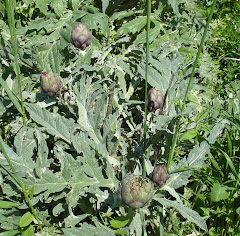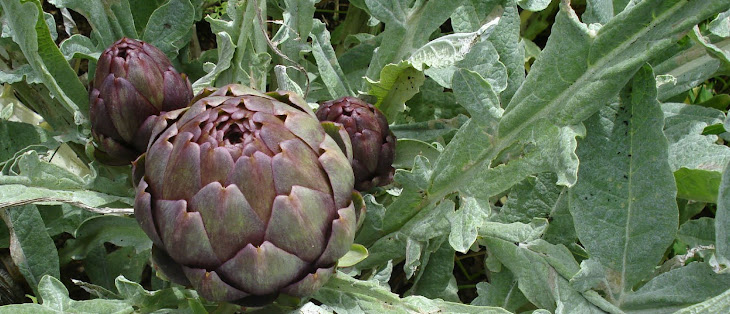Our family holiday is over now and as always the best part of it has been enjoying being together, cooking, eating, drinking, talking, laughing. This post is just a brief round-up of some highlights from this last week.
Les fêtes familiales sont finies et comme toujours nous nous sommes regalés ensemble, dans la cuisine, en mangeant, en buvant, en parlant et en riant. Ici je vous donne un gout de quelques points forts de la semaine dernière.
25 December sky / le ciel du 25 décembre
On Christmas day it was just about warm enough to walk to the garden at midday and have our traditional apéritif there, although this year rather than cold drinks we had mulled wine - a bottle of Domaine d'Estève red wine heated with a few tablespoons of brown sugar, some juniper berries, a cinnamon stick, some cloves and some orange pieces, including the peel.
Olives
We took some of our own olives out of the brine they've been soaking in for two months, rinsed them in plain water and coated them with olive oil. They tasted very good, but a bit salty so we'll soak the others in plain water for a bit longer to get rid of some of the salt. It was exciting to eat our own olives next to our olive tree, as we did last year at the same time - but this time the olives are bigger and better and there are more of them.
Christmas meal / le repas de Noel
Everyone has different ideas about what makes the perfect Christmas meal. We're not very keen on turkey and Christmas pudding, so for many years we've eaten our own different choices which change from year to year. Even when we lived in Wales we didn't eat a traditional Welsh or British Christmas meal, and here we've adopted some of the local festive habits, such as eating oysters. We started the meal with raw oysters, then had very small cups of oyster soup, foie gras with figs (bought in Pézenas market from the producer), and then gambas (large prawns) sautéed in olive oil with a dash of pastis added at the end of the cooking.
We had two main dishes - pigeons for meat-eaters and salt-baked sea bass for non-meat-eaters - both served with sautéed leeks from the garden and potato and celeriac mash.
Salt-baked sea bass
Stuffed pigeons with pancetta
We finished the meal with some of the cherries preserved in Armagnac which I bottled last May.
Since then we've had some more good meals, including a simple, but delicious soup made with cabbage, chestnuts and white wine:
And, on the last evening before the family left, a bonite (small tuna-like fish) marinaded in a charmoula herb mix, stuffed with olives and preserved lemons and roasted on a bed of potatoes and tomatoes. The recipe came from the Guardian weekend magazine but instead of sea bass we used the bonite which I'd bought from our market fish stall a couple of weeks ago and kept in the freezer.
 |  |
We served this dish with an excellent bottle of red Coteaux de Languedoc from the Domaine de la Tour Penedesses in Gabian.
Sustainable?
I think that, like us, most people take a break from some of their principles at this time of the year. We certainly wouldn't claim that our gambas were very eco-friendly, but most of our other food was. The fish we ate was all locally caught and the oysters were produced in the Bassin de Thau. I like foie gras and don't join in the chorus of disapproval which so often results from any mention of this food. I don't think it's any more cruel than other poultry farming and it's much more acceptable to me than the battery-reared chickens to which critics of foie gras seem to have little objection. Anyway, it is very expensive so we can only eat it once a year. We ate as much as we can from the garden at this time of year, although we did buy potatoes, celeriac, chestnuts and tomatoes. We decided not to have a pine tree this year and instead decorated some arbutus and bay branches from the garrigue and from our garden - this looked pretty and best of all didn't drop pine needles on the floor! And, rather than flying, our family travelled to Gabian by train - Eurostar and TGV - a much more sustainable choice.
How do others reconcile treats with principles, I wonder?


















3 comments:
Here's how I look at it- special foods and special events are a core part of the human experience. As long as they remain treats, occurring just a few times a year, there's certainly no harm in it- and if we didn't partake in special foods and events, the harm would be to our souls.
It's when treats (of any kind) become a part of your daily experience that maybe you need to rethink your values. Non-stop greed and gluttony have put us in hot water for all of our history.
Your feast looks absolutely divine. Pigeon and oysters and salted sea bass? Wow. And not to mention those beautiful olives. What a spread!
Hi Ilex - thanks for this thoughtful comment. I absolutely agree - treats and holidays are a vital part of the human experience, but if we have them all the time they cease to be treats and holidays. We have to follow the seasons, too, eating what is in season where we live, most of the time, and not expecting exotic produce to be flown to us across the world for everyday eating.
I'm totally in agreement with the treats for the holidays and not so much for the rest of the year. We are lucky because some of our holiday treats came directly from our garden: fig jam made in the summer and pickled beets, and the lovely pink skinned fingerling potatoes roasted with rosemary, that amazing survived the horrid cold spell we had just before Christmas. I really enjoyed hearing about your feast. I even got some inspiration, yum. Keep up the good work.
Post a Comment